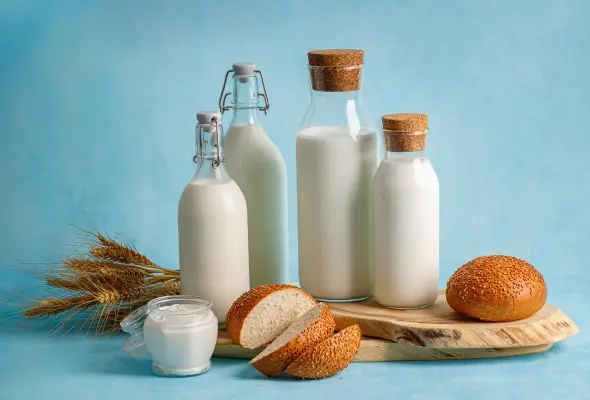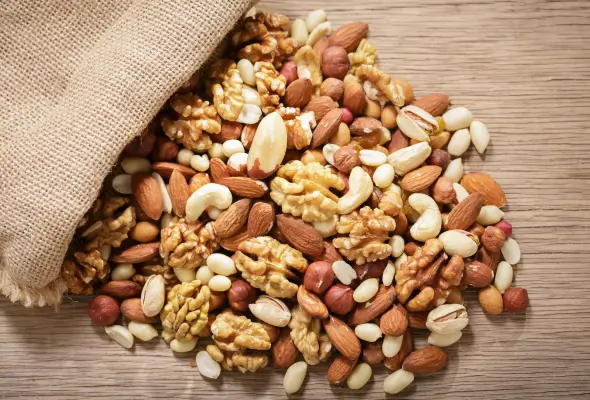12 Foods That Trigger Migraines
Migraines can be debilitating, and for many sufferers, certain foods play a significant role in triggering these painful episodes. Understanding the connection between diet and migraines impacts managing this condition effectively.
12 Foods That Trigger Migraine
Migraine sufferers often find that certain foods can trigger their attacks. Understanding which foods to avoid for migraines can be crucial in managing migraine symptoms. Here are 12 common food triggers for migraines:
- Fermented Foods: Fermented foods, such as aged cheeses, pickled vegetables, and sauerkraut, can be problematic for some migraine sufferers. These foods contain high levels of tyramine, a naturally occurring compound that forms when proteins break down. Tyramine has been linked to migraine attacks in some individuals, particularly those who are sensitive to amines. However, it's important to note that not everyone with migraine is affected by tyramine.

- Nitrates and Nitrites: Processed meats like bacon, sausages, ham, and deli meats often contain preservatives called nitrates and nitrites. These compounds have been associated with triggering migraine attacks in some individuals. Nitrates can cause dilatation of blood vessels, which may contribute to the onset of a migraine. Additionally, nitrates can convert into nitric oxide in the body, which has been linked to headache development. Some studies have found that individuals with a history of migraines may be more susceptible to nitrate-induced headaches.

- Monosodium Glutamate (MSG): MSG is a flavour enhancer commonly used in Chinese cuisine and many processed foods. While its role in triggering migraines has been debated, some individuals report experiencing headaches after consuming foods containing MSG. The exact mechanism by which MSG might trigger migraines is not fully understood. However, it's thought that MSG may affect neurotransmitters in the brain, potentially leading to the onset of a migraine attack.

- Alcohol: Alcoholic beverages, particularly red wine, beer, and spirits, are known migraine triggers for many individuals. About one-third of migraine sufferers report that alcohol can trigger their attacks. The mechanisms behind alcohol-induced migraines are complex and may involve several factors. Alcohol can cause dehydration. Dehydration is one of the most common migraine triggers. Additionally, alcoholic drinks contain compounds called congeners, which are byproducts of fermentation. More abundant in darker drinks like red wine and whiskey, these congeners may contribute to headache development. Alcohol also affects blood flow and can cause the release of certain chemicals in the brain, potentially leading to migraine attacks.

- Gluten: For some individuals with migraine, gluten-containing foods may be a trigger. Gluten is a protein occurring in wheat, barley & rye. While the connection between gluten and migraines is not fully understood, some studies point that individuals suffering from celiac disease or non-celiac sensitivity to gluten may experience more frequent migraines. The inflammatory response triggered by gluten in sensitive individuals may contribute to the activation of migraine pathways. However, it's important to note that not all migraine sufferers are sensitive to gluten, and eliminating gluten from the diet may only be beneficial for those with a confirmed sensitivity or celiac disease.

- Onions: Some migraine sufferers report that onions can trigger their attacks. While there is limited scientific proof linking onions to migraines, they do contain certain compounds that may be problematic for some individuals. Onions are high in sulphur compounds and flavonoids, which can affect blood flow & potentially contribute to migraine development in sensitive individuals. However, more research is needed to establish a clear connection between onions and migraine attacks.

- Dairy Products: Dairy products, mainly aged cheeses and whole milk, have been identified as migraine triggers in some individuals. The relationship between dairy and migraines is complex and can vary from person to person. Some studies suggest that certain components in dairy, such as tyramine in aged cheeses, may contribute to migraine attacks.

- Tyramine-rich Foods: Tyramine is an amine compound found in various foods, mainly aged, fermented, or preserved. Foods high in tyramine are aged cheeses, cured meats, fermented soy products, and certain fruits like overripe bananas and citrus fruits. For some migraine sufferers, consuming tyramine-rich foods can trigger attacks. The exact process is not fully understood, but it's thought that tyramine may affect neurotransmitter levels in the brain, potentially leading to the onset of a migraine. However, sensitivity to tyramine varies among individuals, and not all migraine sufferers are affected by tyramine-rich foods.
- Nuts: Some migraine sufferers report that certain nuts, such as peanuts, almonds, and walnuts, can trigger their attacks. Nuts contain various compounds, including tyramine and other bioactive substances, which may contribute to migraine development in sensitive individuals. However, the evidence linking nuts to migraines is largely anecdotal, and more research is needed to establish a clear connection. It's worth noting that nuts are also rich in beneficial nutrients and may have protective effects against migraines for some individuals.

- Caffeine: The relationship between caffeine and migraines is complex. For some individuals, caffeine can trigger migraine attacks, while for others, it may help alleviate symptoms. Caffeine affects blood flow in the brain and can influence the activity of certain neurotransmitters. Regular caffeine consumption can cause dependency, and sudden withdrawal may trigger migraine attacks in some people. The impact of caffeine on migraines can vary depending on the amount consumed and individual sensitivity. Some studies suggest that limiting caffeine intake to no more than 200mg per day may be beneficial for migraine sufferers.

- Artificial Sweeteners: Artificial sweeteners, particularly aspartame, have been reported as migraine triggers by some individuals. While the evidence is mixed, some studies have found a correlation between aspartame consumption and increased frequency of migraine attacks in sensitive individuals. The exact mechanism by which artificial sweeteners might trigger migraines is not fully understood. Some researchers suggest that aspartame may affect neurotransmitter levels in the brain, potentially leading to the onset of a migraine. However, sensitivity to artificial sweeteners varies among individuals, and not all migraine sufferers are affected by these substances.

Conclusion
Understanding the relationship between diet and migraines has a significant impact on managing this condition effectively. By recognising and steering clear of specific food triggers, individuals can diminish the frequency and severity of their headaches, resulting in an improved quality of life. From fermented foods and processed meats to alcohol and artificial sweeteners, being aware of these potential triggers empowers migraine sufferers to make informed dietary choices.
It's crucial to remember that food triggers can vary significantly from person to person. Keeping a food diary and working with a doctor is recommended to identify personal food triggers. This approach allows for the development of a tailored management plan, helping individuals navigate their diet more effectively and potentially reduce the occurrence of migraine attacks.




Comments
Post a Comment